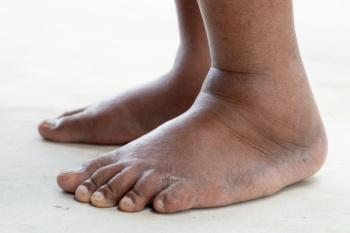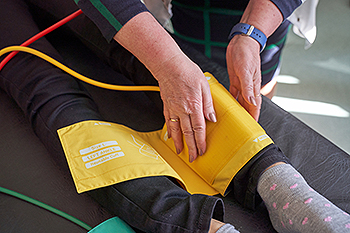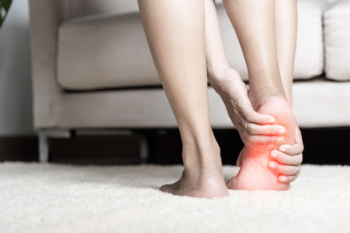
Swelling of the feet, medically known as peripheral edema, can result from various causes ranging from less severe to potentially severe conditions. Mild reasons may include prolonged standing or sitting, dietary factors like excessive salt intake, or wearing ill-fitting shoes. However, severe underlying conditions such as heart failure, kidney disease, venous insufficiency, or deep vein thrombosis can also lead to foot swelling. Regardless of the cause, persistent or sudden onset swelling warrants attention. Suppose your feet are swollen and you are not sure of the cause. In that case, it is suggested that you schedule an appointment with a podiatrist who can perform a comprehensive evaluation, which may involve a medical history review, physical examination, and diagnostic tests, to identify the underlying cause and develop a tailored treatment plan.
Swollen feet can be a sign of an underlying condition. If you have any concerns, contact Dr. Steven Shlonsky of Louisville, Kentucky. Dr. Shlonsky can provide the care you need to keep you pain-free and on your feet.
Swollen feet are a common ailment among pregnant women and people who stand or sit for extended periods. Aging may increase the possibility of swollen feet and patients who are obese often notice when their feet are swelling too. There may be medical reasons why swollen feet occur:
- Phlebitis - A condition that causes the veins to become inflamed and can also cause leg pain.
- Liver disease - This may lead to low blood levels of albumin which is a protein. This can cause fluid in the blood to pass into the tissues and several areas of the body can become swollen.
- Heart failure - When the heart doesn’t pump properly the blood that is normally pumped back to the heart can pool in the veins of the legs causing swollen feet.
- Kidney disease - One of the main functions of the kidneys is releasing excess fluid in the body. This type of condition can make it difficult for the kidneys to function properly, and as a result the feet may become swollen.
- Deep-vein thrombosis (DVT)- This is a serious condition where blood clots form in the veins of the legs. They can block the return of blood from the legs to the heart which may cause the feet to swell. It is important to be treated by a podiatrist if this condition is present.
Swollen feet can also be caused by bone and tendon conditions, including fractures, arthritis, and tendinitis. Additionally, there may be skin and toenail conditions and an infection may cause the feet to swell. Patients who take medicine to treat high blood pressure may be prone to getting swollen feet.
Many patients elevate their feet to help relieve the swelling and this is generally a temporary remedy. When a podiatrist is consulted the reason behind the swelling can be uncovered and subsequently treated.
If you have any questions please feel free to contact our office located in Louisville, KY . We offer the newest diagnostic tools and technology to treat your foot and ankle needs.
 Peripheral artery disease, or PAD, is a condition where the arteries that supply blood to the legs and feet become narrowed or blocked due to plaque buildup. This decreases blood flow to the lower extremities. Symptoms of PAD can vary but often include leg pain or cramping while walking or climbing stairs, which typically eases with rest. Some people may also experience numbness, weakness, or a cold sensation in their lower legs or feet. Changes in the color of the skin or slower growth of the nails may also occur. In more severe cases, PAD can lead to wounds or ulcers on the feet or legs that heal poorly or not at all. Getting diagnosed early is important because PAD can be a sign of more widespread arterial disease, which could increase the risk of heart attack or stroke. Early treatment can help manage symptoms, improve mobility, and reduce the risk of more serious complications. It is suggested that you consult a podiatrist, or foot doctor, for help if you are experiencing any symptoms that sound like PAD.
Peripheral artery disease, or PAD, is a condition where the arteries that supply blood to the legs and feet become narrowed or blocked due to plaque buildup. This decreases blood flow to the lower extremities. Symptoms of PAD can vary but often include leg pain or cramping while walking or climbing stairs, which typically eases with rest. Some people may also experience numbness, weakness, or a cold sensation in their lower legs or feet. Changes in the color of the skin or slower growth of the nails may also occur. In more severe cases, PAD can lead to wounds or ulcers on the feet or legs that heal poorly or not at all. Getting diagnosed early is important because PAD can be a sign of more widespread arterial disease, which could increase the risk of heart attack or stroke. Early treatment can help manage symptoms, improve mobility, and reduce the risk of more serious complications. It is suggested that you consult a podiatrist, or foot doctor, for help if you are experiencing any symptoms that sound like PAD.
Peripheral artery disease can pose a serious risk to your health. It can increase the risk of stroke and heart attack. If you have symptoms of peripheral artery disease, consult with Dr. Steven Shlonsky from Louisville, Kentucky. Dr. Shlonsky will assess your condition and provide you with quality foot and ankle treatment.
Peripheral artery disease (PAD) is when arteries are constricted due to plaque (fatty deposits) build-up. This results in less blood flow to the legs and other extremities. The main cause of PAD is atherosclerosis, in which plaque builds up in the arteries.
Symptoms
Symptoms of PAD include:
- Claudication (leg pain from walking)
- Numbness in legs
- Decrease in growth of leg hair and toenails
- Paleness of the skin
- Erectile dysfunction
- Sores and wounds on legs and feet that won’t heal
- Coldness in one leg
It is important to note that a majority of individuals never show any symptoms of PAD.
Diagnosis
While PAD occurs in the legs and arteries, Podiatrists can diagnose PAD. Podiatrists utilize a test called an ankle-brachial index (ABI). An ABI test compares blood pressure in your arm to you ankle to see if any abnormality occurs. Ultrasound and imaging devices may also be used.
Treatment
Fortunately, lifestyle changes such as maintaining a healthy diet, exercising, managing cholesterol and blood sugar levels, and quitting smoking, can all treat PAD. Medications that prevent clots from occurring can be prescribed. Finally, in some cases, surgery may be recommended.
If you have any questions, please feel free to contact our office located in Louisville, KY . We offer the newest diagnostic and treatment technologies for all your foot care needs.

Ensuring proper shoe fit goes a long way in preventing heel pain, where both support and comfort play pivotal roles. Wearing ill-fitting shoes, particularly high heels, and narrow styles, exacerbate heel discomfort by placing excessive pressure on the heel and altering natural foot mechanics. During the pandemic, the widespread adoption of unsupportive footwear like slippers and flip-flops further contributed to foot problems, as they lacked adequate arch support and cushioning. As individuals age, foot structures change, making them more susceptible to heel pain. Therefore, it is imperative to prioritize footwear that offers ample support and cushioning to alleviate strain on the heels and promote proper alignment. Opting for shoes with a wide-toe box, cushioned insoles, and low to moderate heels can help distribute weight evenly and reduce heel pain. If you suffer from persistent heel pain, it is strongly suggested that you schedule an appointment with a podiatrist who can diagnose the cause and offer guidance on the best shoes to wear for your particular needs and circumstances.
Many people suffer from bouts of heel pain. For more information, contact Dr. Steven Shlonsky of Louisville, Kentucky. Dr. Shlonsky can provide the care you need to keep you pain-free and on your feet.
Causes of Heel Pain
Heel pain is often associated with plantar fasciitis. The plantar fascia is a band of tissues that extends along the bottom of the foot. A rip or tear in this ligament can cause inflammation of the tissue.
Achilles tendonitis is another cause of heel pain. Inflammation of the Achilles tendon will cause pain from fractures and muscle tearing. Lack of flexibility is also another symptom.
Heel spurs are another cause of pain. When the tissues of the plantar fascia undergo a great deal of stress, it can lead to ligament separation from the heel bone, causing heel spurs.
Why Might Heel Pain Occur?
- Wearing ill-fitting shoes
- Wearing non-supportive shoes
- Weight change
- Excessive running
Treatments
Heel pain should be treated as soon as possible for immediate results. Keeping your feet in a stress-free environment will help. If you suffer from Achilles tendonitis or plantar fasciitis, applying ice will reduce the swelling. Stretching before an exercise like running will help the muscles. Using all these tips will help make heel pain a condition of the past.
If you have any questions please contact our office located in Louisville, KY . We offer the newest diagnostic and treatment technologies for all your foot and ankle needs.








